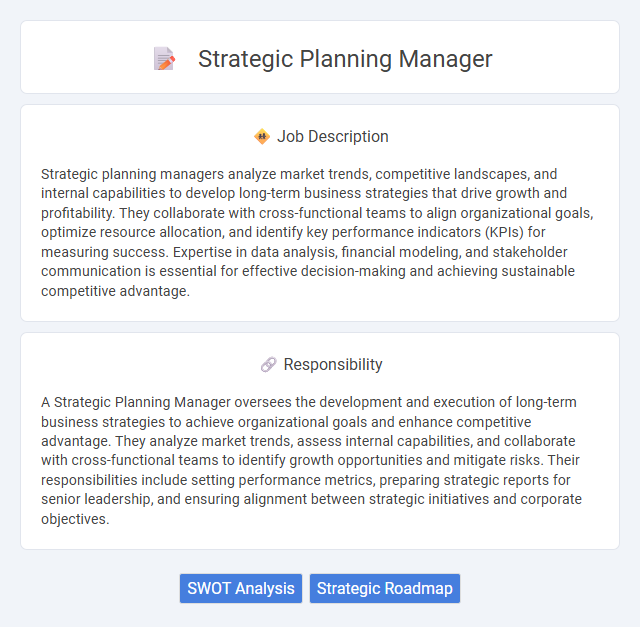
Strategic planning managers analyze market trends, competitive landscapes, and internal capabilities to develop long-term business strategies that drive growth and profitability. They collaborate with cross-functional teams to align organizational goals, optimize resource allocation, and identify key performance indicators (KPIs) for measuring success. Expertise in data analysis, financial modeling, and stakeholder communication is essential for effective decision-making and achieving sustainable competitive advantage.
Individuals who are analytical, detail-oriented, and adept at problem-solving are likely to thrive as a strategic planning manager. Those comfortable with ambiguity and able to make decisions under pressure may find this role suitable, as it often requires forecasting and adapting to market changes. People who prefer structured routine tasks may have a lower probability of success in this dynamic and forward-thinking position.
Qualification
A Strategic Planning Manager typically holds a bachelor's degree in business administration, finance, or a related field, with many positions requiring an MBA or advanced degree for enhanced strategic insight. Proven experience in market analysis, financial forecasting, and competitive strategy development is essential, alongside strong proficiency in data analytics tools and project management software. Exceptional leadership, communication, and critical thinking skills are critical for aligning organizational goals with long-term business strategies.
Responsibility
A Strategic Planning Manager oversees the development and execution of long-term business strategies to achieve organizational goals and enhance competitive advantage. They analyze market trends, assess internal capabilities, and collaborate with cross-functional teams to identify growth opportunities and mitigate risks. Their responsibilities include setting performance metrics, preparing strategic reports for senior leadership, and ensuring alignment between strategic initiatives and corporate objectives.
Benefit
A Strategic Planning Manager likely enhances organizational decision-making by analyzing market trends and forecasting future opportunities. Their expertise probably leads to more efficient resource allocation and improved long-term business growth. Companies may benefit from reduced risks and better alignment of strategic initiatives with corporate goals through their guidance.
Challenge
The role of a Strategic Planning Manager likely involves navigating complex market dynamics and aligning cross-functional teams under a unified vision. Challenges may include anticipating industry shifts and managing resource constraints while driving long-term growth initiatives. Success in this position probably depends on adapting strategies swiftly to changing business environments and stakeholder expectations.
Career Advancement
A Strategic Planning Manager drives long-term business growth by analyzing market trends, developing actionable strategies, and aligning resources with corporate goals. Mastery in data analysis, leadership, and cross-functional collaboration positions professionals for senior roles such as Director of Strategy or Chief Strategy Officer. Continuous skill development and successful project execution are key factors accelerating career advancement in strategic planning.
Key Terms
SWOT Analysis
A Strategic Planning Manager leads the development and implementation of long-term business strategies by conducting comprehensive SWOT analysis to identify internal strengths and weaknesses alongside external opportunities and threats. This role involves synthesizing data from market trends, competitor behavior, and organizational capabilities to formulate actionable plans that drive sustainable growth. Expertise in SWOT analysis enables the manager to recommend strategic initiatives that align resources with high-impact opportunities while mitigating potential risks.
Strategic Roadmap
A Strategic Planning Manager is responsible for developing and executing a comprehensive strategic roadmap that aligns with the organization's long-term goals and competitive positioning. This role involves analyzing market trends, identifying growth opportunities, and coordinating cross-functional teams to ensure effective implementation of strategic initiatives. Expertise in data-driven decision-making and project management tools enhances the precision and impact of the strategic roadmap.
 kuljobs.com
kuljobs.com